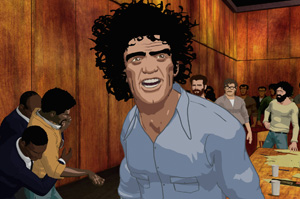The end came when the country and its troops had already been so utterly demoralized that the only thing to do was stop fighting. In the middle of these efforts to organize and protest against the government, there is perhaps no better example than the story of the “Chicago 10.”
The story has found new life in the hands of documentary filmmaker Brett Morgen. Having been raised in the ’80s, Morgen says he had the weight of the ’60s on his shoulders. The film is perhaps his catharsis.
Chicago 10’s innovations bring about new possibilities for documentary film. Half archival footage and half motion-capture animation, this film explores the boundaries of recreation and re-enactment of true events.
The 1968 Democratic Convention was held in Chicago. In a period of national turmoil, people decided to protest the political event.
Two such folk were Abbie Hoffman and Jerry Rubin, who coined the term “yippie.” The yippies were going to live and sleep in Lincoln Park – all in the name of peace – then march over to the International Amphitheatre, the venue where the convention was being held that year. The mayor of Chicago at the time, Richard Daley, made it quite clear there would be no tolerance for such protests in his city.
What happened next ended up turning into one of the most compelling pieces of legislative and judicial history. The government held and tried eight of the most vocal activists who were accountable for the riots that had originated from the war protests.
The riots, however, were witnessed on live television, before the eyes of the nation. The court case would end up representing a clash between new cultural icons (among them Hoffman and Rubin) and the authority of the law. At the end of the trial, every defendant would be acquitted of conspiracy charges, but five of them were convicted of incitement.
Writer and director Morgen extensively researched the court transcripts and other legal documents in order to compile the most relevant and synthesized information for the film. Since so much of the case was like a cartoon show – antics and craziness – Morgen thought the animated reenactments would be suitable. From Allen Ginsberg’s renditions of his own poetry to the gagging of Black Panthers leader Bobby Seale, the case was as absurd as it was momentous.
“It was so over the top,” Morgen says.
The choice to animate the court scenes is one that makes the film so innovative, as well as artistically compelling.
“It is not a history lesson,” continues Morgen. “This isn’t a movie about the ’60s – I wanted it to be a fable for all ages.”
For the voice talent behind the animation, some of Hollywood’s finest actors were brought in to read. Professional voice imitators just wouldn’t do the trick.
Abbie Hoffman is played by Hank Azaria (an actor who has proven his vocal talents on “The Simpsons”), and Mark Ruffalo voices Rubin. Other great performers, like Jeffrey Wright, Liev Schreiber, Nick Nolte and Roy Scheider. are also featured.
Ultimately, Morgen has constructed a film that acts as a springboard for political awareness.
“The film holds a mirror up to each one of us,” he says.
In discussing his film, there’s a genuine optimism in his voice, motivated by the thought that his audience will take something from Chicago 10.
“Most social change is brought upon by young people,” he offers.
Morgen has the sensitivity of a poet while maintaining the passion of an activist. He is a joy to behold – an artist in his own element, taking great pride in his work. It’s exciting to imagine the possibilities for change his work could bring.
Chicago 10 releases in select theaters Feb. 29.












